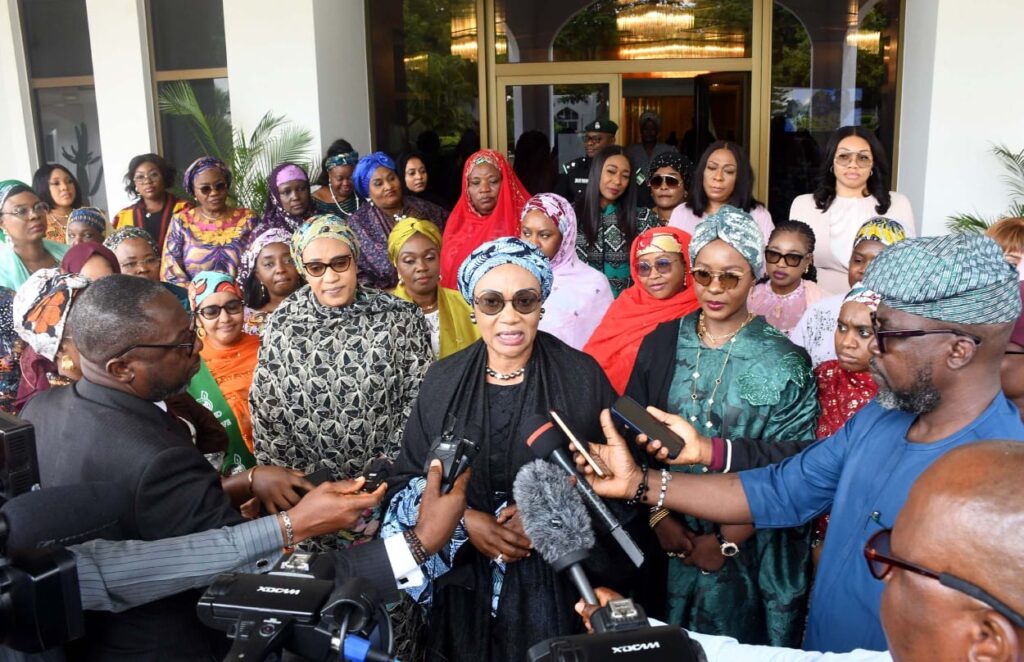From Juliana Taiwo-Obalonye, Abuja
Nigeria’s First Lady, Senator Oluremi Tinubu, has strongly condemned the recent wave of violent killings in Benue State and other parts of the country, describing them as “very, very evil.”
Speaking at the 2nd quarter review meeting of the Renewed Hope Initiative (RHI) with governors’ spouses at the State House, Abuja, on Monday, June 23, she appealed for intensified prayers and unity to end the bloodshed devastating communities, particularly in Benue and the Middle Belt.
Addressing the violence, which has claimed over 200 lives in Benue according to security reports, Mrs Tinubu said, “This is evil, very, very evil. We women have to pray because I don’t know those who are so bloodthirsty.” She noted the longstanding nature of the conflict, recalling, “Benue issue is not now. Even Plateau is not now. I remember when I was in the Senate, we lost one senator Gyang at that time. So it’s been ongoing for a long time.”
She expressed deep concern over the senseless loss of lives and urged Nigerians to pray more. “We need prayers. We’ve been praying, but we have to pray more,” she stressed, emphasising spiritual and communal unity to combat the crisis.
Despite the turmoil, Mrs Tinubu highlighted Nigeria’s potential, noting increased investor interest.
“Nigeria is a beautiful country. I’ve travelled all over the world, and this is the time investors are coming by the day. You can see the last ECOWAS meeting, and AfriExim Bank is almost taking off. People are coming. The days when Nigeria was noted for scams, it’s gone down,” she said. She urged Nigerians to promote peace and positive narratives to sustain this progress.
The First Lady also called for the Senate to formally recognise the Office of the First Lady, arguing it deserves institutional support to enhance its social impact. “I believe that the Office of the First Lady should be given the credence it deserves,” she said, referencing the lack of dedicated infrastructure until the Babangida era. She proposed that First Ladies be allowed to manage specific projects with direct funding, similar to zonal intervention programmes, suggesting N500 million to N1 billion annually for accountable initiatives.
Mrs Tinubu emphasised RHI’s transparency, citing donor-funded programmes like frontline health worker support, where funds are retired to secure further tranches. “We can sit in the villa and eat, travel abroad, and do nothing. But for me, I want to make society better,” she said, underscoring her commitment to meaningful change.
She provided an update on RHI’s progress, noting its impact on vulnerable Nigerians through grants, not loans, to foster sustainable livelihoods. Examples include N200,000 grants for 250 people with disabilities per state and increased elderly support to N200,000. She praised Akwa Ibom’s monthly elder stipends and highlighted a modest scholarship scheme for 47 students, prioritising sustainability over publicity. “I could say I’m doing scholarships for 1 million Nigerians. That’s a fluke,” she remarked.
Recounting a Senate-era initiative, she shared, “I gave 500 women N20,000 recapitalisation grants each. One sold akara and plantain and said, ‘With this, I can fry chicken and turkey.’ Then I knew my work was done.”
Chairperson of the Nigeria Governors’ Spouses’ Forum, Olufolake AbdulRazaq, commended RHI’s grassroots reach, noting interventions in health, education, and empowerment across all local governments. “We use primary health care centres to ensure the indigent benefit,” she said, affirming equitable distribution.



